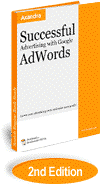This site is for sale,
Learn More
Google AdWords
Choosing Your Match Type
By Esoos Bobnar
www.searchenginehelp.com
Originally Published: January 2005
Continued From:
<<< Target Local Markets
Choosing Your Match Type
Initially, you're going to want to start with a smallish list (no more than 100) of what you anticipate to be your most effective keywords. Once you have this keyword list, you'll have to decide how much leeway to give Google in matching search queries to those keywords. Google AdWords has three styles of matching, and it is
critical
that you understand the difference between them. The three types of matching are:
1. Broad match
This is the most general type of match. To run your keywords as broad match, you simply enter your terms on a single line in your keyword list with no quotes or brackets. Your ad will appear for any search that has your keywords in it, in any order, with any other words, and will also appear for searches that include plurals, misspellings, and synonyms of your terms.
For many terms, broad matching is too broad, and will produce undesirable results. For instance, if you do a broad match bid for the term
comic books, your ad will appear for such searches as
books by comic george carlin
and even
book tickets for comic george carlin, as well as many other possibly unrelated searches.
Broad match requires the least amount of work on your part since most related keywords will automatically be generated for you. It relieves you from having to build your own detailed keyword list. But, as we mentioned, broad match can also produce a lot of untargeted impressions. If you
do
use broad match, be sure to bid lower than you would for more targeted matches.
You should especially avoid broad matching single word terms as they can cause your ad to be displayed for a huge number of variations. For instance, if you just did a broad match bid on the term
mobile, your ad will be shown to people looking for mobile homes, mobile phones, and Mobile, Alabama - not the most targeted group of customers.
Of course, there could be cases where a single keyword is specific enough that all permutations are related to your business (product names, for instance). In such cases, if you do a broad match bid on a single keyword, you'll still want to add sufficient
negative keywords
to facilitate high targeting. If you can manage to do this, while keeping your click-throughs above the 0.5% cut-off rate, then the keyword might be very profitable for you. Of course, this may end up making broad match the most labor-intensive match option, since you might need to brainstorm a huge list of negative keywords.
Occasionally you will find a high-traffic single keyword with very little competition. This is usually because your competitors aren't able to achieve a sufficient CTR to remain in that space for long - due to poor ad copy or ineffective use of negative keywords. In such cases you could end up spending very little
per click
for a reasonably high volume keyword. Of course, much of your success will depend on being able to present compelling ads that pull sufficient click-throughs and filtering out irrelevant traffic through negative keywords.
To summarize:
we generally do not recommended broad match
since the targeting is so bad. Another reason is that it can also be very difficult to track which variations of a keyword are profitable and which are just wasting money. It's usually better to find all these variations for yourself through keyword research and use the
exact match
option to determine which variations are most effective.
2. Phrase match
This is the second most general type of match. To run your keywords as phrase match, you simply enter your terms on a single line in your keyword list surrounded by quotes. Your ad will then appear for any search that contains your keywords in the order you specify - even if other terms are also included in the search.
For instance, if you were phrase-match bidding on the term
cell phone, your ad would also show for such searches as
buy cell phone
and
cell phone repair, but not for
cell phones.
3. Exact match
This is the most restrictive type of match. Terms are entered on a single line in your keyword list with brackets. Your ad will only appear for searches that exactly match all the terms in those brackets, in that order, and do not contain any other terms.
This type of matching requires more research but also provides the most targeted results. Interestingly, very few advertisers bother with exact match and this fact alone can open the door for you to gain the competitive advantage over your lazier competitors.
We recommend that you use exact match for the majority of your terms.
Continued:
Organize Your Ad Groups >>>
Continued From:
<<< Target Local Markets
Editor's Note:
See also:
Successful Advertising with Google AdWords
eBook
Copyright 2005 by Planet Ocean, reprinted with permission.
Site Promotion Articles Indexes:
|
![]()
